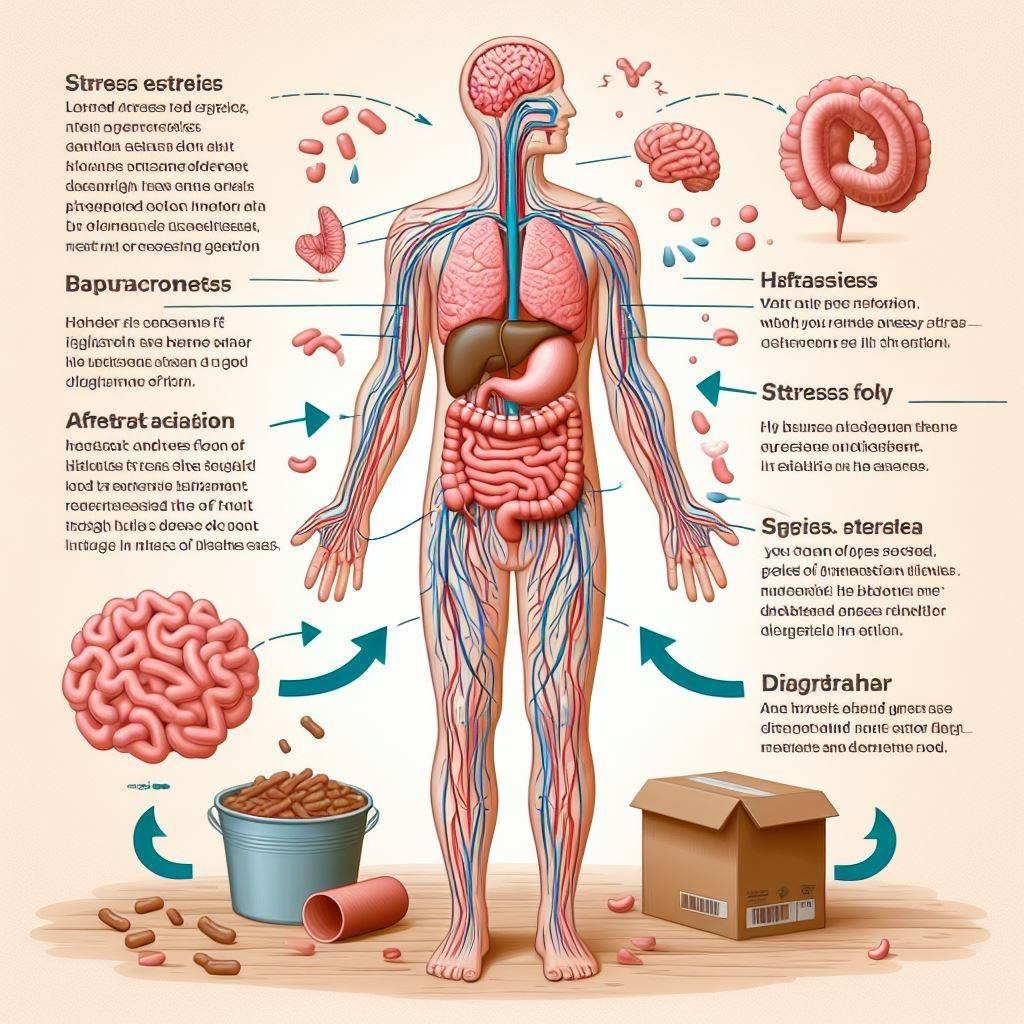Can Stress Cause Diarrhea? Unveiling the Gut-Brain Connection.
Explore the gut-brain connection: Can stress cause diarrhea? Uncover the link between stress and gastrointestinal symptoms.
Key Takeaways
| Cause | Effect |
| Stress | Increased intestinal motility, leading to diarrhea |
| Anxiety | Diarrhea, nausea, and abdominal cramps |
| Depression | Altered gut microbiome and digestive issues |
Introduction
Have you ever experienced sudden bouts of diarrhea during times of intense stress or anxiety? If so, you’re not alone. Stress and diarrhea are closely linked, and this connection is rooted in the intricate relationship between the brain and the gut. In this article, we’ll explore the gut-brain axis, examine how can stress cause diarrhea, and provide tips for managing stress-related digestive issues.
Can Stress Cause Diarrhea?
- Yes, stress can trigger diarrhea and other gastrointestinal problems because of the gut-brain connection.
- Chronic stress can disrupt the communication between the brain and gut, leading to digestive issues like diarrhea, constipation, and abdominal pain.
- Managing stress through relaxation techniques, a healthy diet, exercise, and seeking support can help prevent stress-induced diarrhea.
The Gut-Brain Connection
The gut and the brain share a complex and bidirectional communication pathway, often referred to as the gut-brain axis. This connection involves a network of neurons, hormones, and neurotransmitters that allow the gut and brain to constantly exchange information.
The gut is often referred to as the “second brain” because it contains an extensive network of neurons, known as the enteric nervous system, which controls various digestive processes. This intricate system is responsible for regulating gut motility, nutrient absorption, and immune function, among other vital processes.
How Can Stress Cause Diarrhea?

When you experience stress, your body triggers the “fight or flight” response, also known as the stress response. This response is designed to prepare your body to handle potential threats or challenges. However, this stress response can also affect your digestive system, leading to a range of gastrointestinal issues, including diarrhea.
Here’s how stress can cause diarrhea:
- Altered Gut Motility: Stress can increase the motility (movement) of the intestines, causing food and waste to pass through the digestive tract more quickly. This rapid transit time can lead to diarrhea, as the body doesn’t have enough time to properly absorb water from the stool.
- Inflammation: Chronic stress can trigger inflammation in the gut, which can disrupt the normal functioning of the digestive system and contribute to diarrhea and other gastrointestinal problems.
- Changes in Gut Microbiome: Stress can alter the composition and diversity of the gut microbiome, the collection of beneficial bacteria that reside in the intestines. An imbalance in the gut microbiome can lead to digestive issues, including diarrhea.
- Increased Gut Permeability: Stress can compromise the integrity of the intestinal lining, leading to a condition known as “leaky gut.” This increased permeability can allow harmful substances to enter the bloodstream, triggering an immune response and contributing to diarrhea and other digestive problems.
Other Stress-Related Gastrointestinal Symptoms
While stress causes diarrhea c is a common manifestation of the gut-brain connection, stress can also lead to other gastrointestinal symptoms, such as
- Constipation
- Abdominal pain or cramps
- Bloating
- Nausea
- Loss of appetite
- Heartburn or acid reflux
These symptoms can occur because of the same mechanisms that trigger stress-induced diarrhea, such as altered gut motility, inflammation, and changes in the gut microbiome.
Managing Stress-Related Diarrhea
If you’re experiencing frequent bouts of diarrhea because of stress, there are several strategies you can employ to manage your symptoms and improve your overall well-being:
- Practice Relaxation Techniques: Engaging in relaxation practices, such as deep breathing exercises, meditation, yoga, or progressive muscle relaxation, can help reduce stress levels and promote a sense of calm.
- Adopt a Healthy Diet: A balanced and nutrient-rich diet can support a healthy gut and reduce inflammation. Focus on consuming foods rich in fibre, probiotics, and anti-inflammatory compounds, such as fruits, vegetables, whole grains, and fermented foods.
- Exercise Regularly: Regular physical activity can help reduce stress levels, improve mood, and promote healthy digestion. Aim for at least 30 minutes of moderate exercise most days of the week.
- Seek Support: Talking to a therapist, or counsellor, or joining a support group can help you develop effective coping strategies for managing stress and anxiety.
- Consider Stress-Reducing Supplements: Some supplements, such as probiotics, omega-3 fatty acids, and adaptogenic herbs like ashwagandha, may help reduce stress and support a healthy gut.
- Identify and Manage Triggers: Pay attention to the situations or events that trigger stress and diarrhea for you. Once you’ve identified these triggers, you can develop strategies to avoid or better manage them.
Remember, chronic stress and diarrhea can be signs of an underlying condition, so it’s essential to consult with a healthcare professional, especially if your symptoms persist or worsen.
The Importance of Gut Health
Maintaining gut health is crucial for overall well-being, as the gut plays a vital role in digestion, nutrient absorption, and immune function. By addressing stress-related diarrhea and other digestive issues, you can support a healthy gut and prevent more serious health problems down the line.
One way to promote gut health is by consuming a diet rich in prebiotics and probiotics. Prebiotics are types of dietary fiber that feed the beneficial bacteria in your gut, while probiotics are live bacteria that can help maintain a healthy gut microbiome.
Here are some examples of prebiotic and probiotic-rich foods:
Prebiotic Foods:
- Asparagus
- Bananas
- Onions
- Garlic
- Whole grains
- Artichokes
Probiotic Foods:
- Yogurt
- Kefir
- Sauerkraut
- Kimchi
- Miso
- Tempeh
Incorporating these foods into your diet can help support a diverse and balanced gut microbiome, which in turn can improve digestion, boost immunity, and reduce the risk of stress-related diarrhea and other gastrointestinal issues.
Stress and Other Digestive Disorders
While can stress cause diarrhea is a common manifestation of the gut-brain connection, stress can also play a role in the development or exacerbation of other digestive disorders, such as
- Irritable Bowel Syndrome (IBS): Stress is a well-known trigger for IBS symptoms, which can include abdominal pain, bloating, constipation, and diarrhea.
- Inflammatory bowel disease (IBD): Chronic stress can contribute to the development and flare-ups of inflammatory bowel diseases like Crohn’s disease and ulcerative colitis.
- Peptic Ulcers: Stress can increase the production of stomach acid, which can contribute to the formation of peptic ulcers in the stomach or duodenum.
- Gastroesophageal Reflux Disease (GERD): Stress can relax the lower esophageal sphincter, allowing stomach acid to reflux into the esophagus, leading to heartburn and other GERD symptoms.
If you suspect that stress is contributing to a digestive disorder, it’s essential to consult with a healthcare professional for proper diagnosis and treatment.
Stress Management Techniques

Managing stress is crucial for maintaining overall health, including digestive health. Here are some effective stress management techniques to consider:
- Mindfulness and meditation: Practicing mindfulness and meditation can help reduce stress and promote relaxation. Apps like Calm, Headspace, and Insight Timer offer guided meditations for beginners.
- Deep Breathing Exercises: Taking slow, deep breaths can activate the parasympathetic nervous system, which is responsible for the “rest and digest” response, counteracting the stress response.
- Yoga and Tai Chi: These mind-body practices combine gentle physical movements, breathing exercises, and meditation, promoting relaxation and stress relief.
- Progressive Muscle Relaxation: This technique involves systematically tensing and relaxing different muscle groups, promoting a state of deep relaxation.
- Journaling: Writing down your thoughts and feelings can be a cathartic way to process stress and gain perspective.
- Social Support: Connecting with friends, family, or support groups can provide a sense of belonging and emotional support during stressful times.
- Counselling or therapy: Speaking with a mental health professional can help you develop effective coping strategies for managing stress and anxiety.
Remember, different techniques work for different people, so it may take some experimentation to find the stress management strategies that work best for you.
When to Seek Medical Help
While occasional bouts of stress-induced diarrhea are common and usually resolve on their own, there are certain situations where it’s essential to seek medical attention:
- If you experience severe, persistent, or bloody diarrhea
- If you have a fever or other concerning symptoms,
- If you experience significant weight loss or dehydration
- If your diarrhea is accompanied by severe abdominal pain,
- If you have a chronic or underlying condition that could be contributing to your symptoms,
Your healthcare provider can help determine the underlying cause of your diarrhea and provide appropriate treatment or management strategies.
Conclusion
The gut-brain connection is a fascinating and complex relationship that highlights the intricate communication between our digestive system and our brain. While can stress cause diarrhea and other gastrointestinal issues, managing stress through relaxation techniques, a healthy diet, exercise, and seeking support can help alleviate these symptoms and promote overall well-being.
Remember, chronic stress and persistent digestive issues can be signs of an underlying condition, so it’s essential to consult with a healthcare professional if your symptoms persist or worsen. By prioritizing stress management and gut health, you can take proactive steps toward improving your overall quality of life.
For more information on managing stress and promoting gut health, check out our article [Insert Internal Link to Your Most Important Article in the Same Category].
FAQs about Can Stress Cause Diarrhea
Can stress cause diarrhea in children?
Yes, stress can trigger diarrhea in children as well. Children may experience stress because of various factors, such as changes in routine, school pressures, family conflicts, or traumatic events. It’s important to identify and address the underlying causes of stress in children to prevent stress-related digestive issues.
How long does stress-induced diarrhea last?
The duration of stress-induced diarrhea can vary depending on the individual and the severity of the stress. In most cases, the diarrhea resolves once the stressful situation has passed or when stress levels are effectively managed. However, if diarrhea persists for more than a few days, it’s advisable to seek medical attention.
Can stress cause chronic diarrhea?
While stress is often a trigger for acute diarrhea, chronic, or persistent diarrhea can be a sign of an underlying condition, such as irritable bowel syndrome (IBS), inflammatory bowel disease (IBD), or other digestive disorders. If you experience chronic diarrhea, it’s important to consult with a healthcare professional for proper diagnosis and treatment.
Can stress cause diarrhea during pregnancy?
Yes, stress can contribute to diarrhea during pregnancy. Hormonal changes, anxiety, and the physical demands of pregnancy can increase stress levels, leading to digestive issues like diarrhea. It’s important to stay hydrated and consult with your healthcare provider if you experience persistent diarrhea during pregnancy.
Can stress cause diarrhea in older adults?
Stress can trigger diarrhea in older adults as well. Older adults may experience stress because of various factors, such as health concerns, loneliness, or changes in living situations. Additionally, age-related changes in the digestive system can make older adults more susceptible to stress-induced digestive issues. Proper stress management and medical attention are crucial for older adults experiencing stress-related diarrhea.
Remember, while stress can indeed cause diarrhea, persistent or severe diarrhea should always be evaluated by a healthcare professional to rule out any underlying medical conditions.
Recommended reading
Calm the Storm: 19 Powerful Stress Reduction Techniques

Adel Galal is a health and wellness writer with over 30 years of experience studying and writing about health, fitness, nutrition, and healthy living. He is the founder of NextFitLife.com, where he shares practical, evidence-based guidance to support long-term health at any age. Adel’s mission is simple:
to help people make smarter health choices that fit real life, at any age.



